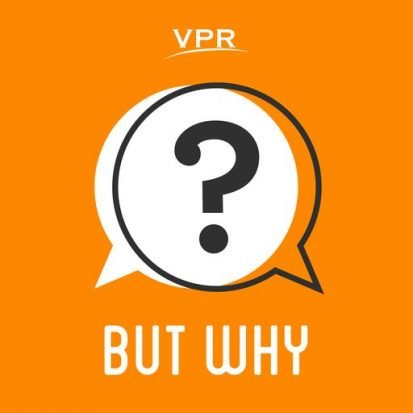
Why do pigs oink?
Leave a reviewWhy do pigs snort? And why do we call their snorts “oink” in English? We’re taking our exploration of animal noises in two directions today. First we’ll learn about why we use different words to describe animal noises, depending on what language we’re speaking. And then we’ll examine what animals are actually saying when they oink or tweet or moo! Our guests are linguist and author Arika Okrent and bioacoustic researcher Elodie Briefer, of the University of Copenhagen. Other questions we tackle in this episode: Do cows make different amounts of “moos” to say different words? Why do ducks make loud noises? Why do roosters cockadoodle-do in the morning? PLUS, so many kids sent us animal noises in different languages and we’ll hear them all!
© Vermont Public Radio | 31:26
|Episode: 177 |
Full episode description
 Episode One: But Why: Intro For Adults
Episode One: But Why: Intro For Adults
This is an Episodic show. You can listen to it in any order, but episode one is always a great place to start.
Full Episode description
Why do pigs snort? And why do we call their snorts “oink” in English? We’re taking our exploration of animal noises in two directions today. First we’ll learn about why we use different words to describe animal noises, depending on what language we’re speaking. And then we’ll examine what animals are actually saying when they oink or tweet or moo! Our guests are linguist and author Arika Okrent and bioacoustic researcher Elodie Briefer, of the University of Copenhagen. Other questions we tackle in this episode: Do cows make different amounts of “moos” to say different words? Why do ducks make loud noises? Why do roosters cockadoodle-do in the morning? PLUS, so many kids sent us animal noises in different languages and we’ll hear them all!
Download our learning guides: PDF | Google Slide | Transcript
Bioacoustics is the study of sounds made in nature. Scientists like Elodie Briefer study how animals make sounds and what information we can find in those sounds. Scientists will record sounds and use computers to measure and analyze what they hear and use observational skills to help determine what the sounds might mean.
Animals speak in emotion, not in words. Pigs have contact calls as well as positive and negative calls. Researchers have found that pigs will make longer calls when they are unhappy. Scientists and animal welfare advocates hope to use this information to eventually develop an app that farmers can use to improve animals’ lives on farms.
With words like moo, oink and cockadoodle-do, we are giving a name to a sound. But we’re not just trying to mimic the sound. Most of us can make the sound of a pig snort but we need words like oink because we don’t want to stop using our language to make a pig snort in the middle of a conversation.
Human voices are capable of millions of sounds but a language only uses a subset of those sounds. Our animal noise words will use the sounds available in our individual languages.
Words that sound like the sound they are describing are called onomatopoeia.
An animal has to have some cultural importance for a language to create a word for its call. That’s why we don’t have words in English for the noise a camel or a sloth would make. In Turkish there is no word for a pig call because that culture doesn’t keep pigs on farms.
© Vermont Public Radio | Status: Active, 220 episodes | Kind: Episodic | Episode URL
The content, Artwork and advertising within this podcast is not owned or affiliated with Sound Carrot and remain the property of their respective owners.









